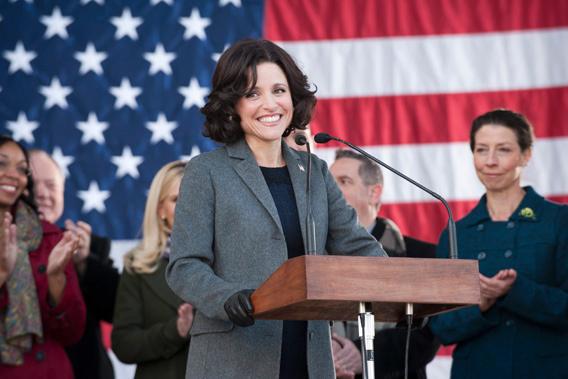Last year, in every episode of Veep (HBO, Sundays at 10 p.m. ET), Vice President Selina Meyer (Julia Louis-Dreyfus) delivered the saddest catchphrase on TV. She’d return to her office or seek solace after a photo op was waylaid by gaffes, and she’d ask a secretary: “Did the president call?” He never called. That was the joke. It was the final injury piled upon insults, like watching Tom get bested by Jerry for 30 minutes, then learning he has gout.
Meyer was simply too pathetic in that first season. That might be the reason House of Cards, the Netflix series released this winter, became Washington’s political-satire-inspired-by-a-British-satire of choice. It wasn’t smarter than Veep, but its characters were allowed to win sometimes. Francis Underwood snuck all manner of crimes past a compliant media, and we loved him for it. (He actually got away with less than his British counterpart, who managed constantly, untraceably to murder people who combed his secrets.) Selina Meyer couldn’t even fake-cry on camera without the scheme getting leaked.
That’s all in the past. This season starts with Meyer stumping for candidates in the midterm, armed with a decked-out bus and hideous applause lines. (“Freedom is not me-dom—it’s we-dom!”) The president’s party loses, but some junior members of the political data team realize that Meyer’s campaign visits were candidate Viagra. “You’re acing POTUS,” says one analyst. “You’re Neo!”
Suddenly the White House almost needs her. She has access to the White House chief of staff, played as a loser by Kevin Dunn—the dad from the Transformers trilogy, somehow even less authoritative here. “We all know the White House would work so much better if there wasn’t a president,” he tells Meyer. “But there is, and we have to work around that.” Her prize for having, as the callow new adviser played by Gary Cole notes, “traction with the swing voters”: an actual role in the administration, in foreign policy. And happily for Veep, that means she gets to commit higher-quality mishaps.
Veep creator Armando Iannucci got an Oscar nomination for In the Loop, his farce about the start of an Iraq–like war, which wrenched jokes out of a conflict that would kill tens of thousands of people. The higher the stakes, the funnier it was. Meyer’s expanded foreign-policy brief gets her Situation Room access and planning roles in military missions. When Meyer meets her daughter’s new boyfriend, an Iranian-American, the vice president can only think about the next rung. Louis-Dreyfus pulls this off with some excellent mugging and awkward conversation—“Oh, you speak Farsi?”—before telling an aide to vet the boy and his family. She’s not pathetic anymore, and a darker farce is a funnier farce.
The whole mood of the show changes around her. House of Cards and Veep 1.0 spent a decent amount of time creating media foils who could quickly suss out whether one of the protagonists was savvy or doomed. The traditional media’s less present in this season. Local TV reporters ask predictable questions, all of them far less important than Reddit and Tumblr and the Internet meme factory. It’s true. It stings. “What in the living fuck is this?” says Meyer when she’s handed a word cloud. “Do people not use sentences anymore?”
Veep’s supporting cast doesn’t share in the glory. The Ohio congressman who swore to bring down Meyer, played like a future murderer by Dan Bakkedahl, skulks around issuing threats to his aides. “I’m running out of nice juice to spray on these fucks,” he says—but he doesn’t matter anymore. Jonah (Timothy Simons), the toothsome, fist-pumping White House liaison, undergoes a quick change from jerk to sycophant, in sync with Meyer’s current level of clout. “You’re obsolete!” laughs Dan Egan (Reid Scott), the “shit” Meyer hired last season to bump up her PR. “You’re like an old VCR, but with a bigger mouth.”
I enjoyed the first run of Veep and didn’t particularly mind its departures from the real D.C. But Meyer’s new seriousness does wonders for the comedy. Maybe it’s playing catch-up. When Veep was pitched, America was in the last throes of its fascination with Sarah Palin. The real veep, Joe Biden, was a late-night joke whose most-watched accomplishment was out-debating Palin; the average debate-watcher probably thought he could do the same from his couch. But our vice president has won two elections now, he too has an expanded foreign-policy brief, and either he or Hillary Clinton has the advantage for the next Democratic nomination. It’s unexpected and compelling. So is Veep.
